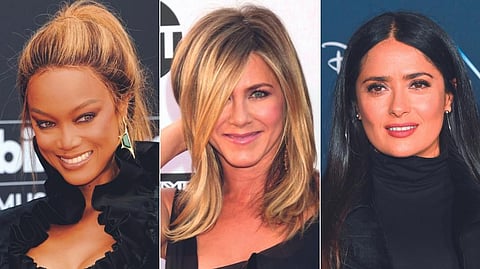Beauty is going back to basics
The pandemic saw many women embrace a more natural look and ditch expensive cosmetics. Laura Craik says it’s a trend that isn’t going anywhere

In times of hardship, goes the theory, the sales of lipstick soar. Unable to afford cars or expensive holidays, women have historically visited the make-up counter for a mini sugar-hit of luxury, in the shape of a sleek tube of cosmetic.
But said theory reckoned without a global pandemic, where months of mask-wearing made any sort of lipstick redundant – and has perhaps ushered in a whole new trend towards naturalness.
According to new data from consumer research firm Kantar, make-up sales in the UK have fallen by almost a fifth since 2019, while the frequency with which people wear products has dropped by a third. It’s the prestige sector of the beauty industry that has suffered the most, with sales of designer makeup in department store counters down by 40 per cent. Visits to high street salons for nail, hair and other beauty treatments are also reported to be down dramatically.
That the pandemic has fundamentally changed our outlook on beauty is understandable. Few of us would bother making up our faces when confined at home. The imperative to look presentable on Zoom may have influenced our behaviour at the start of lockdown, but the novelty soon wore off, as did the incentive.
Most of us were deriving what could almost be called pride from embracing our roots, our unembellished faces and our naked skin. So, out has gone the painted Kardashian look, and in comes a more natural aesthetic. Somehow, being overly made-up suddenly seems indecent, out of step with more sober times.
On Instagram, celebrities have been keen to reflect the trend, with Salma Hayek, Jennifer Aniston, Tyra Banks, Kate Winslet, Drew Barrymore and Gwyneth Paltrow just a few of the midlife women posting #nomakeup selfies on their feeds over the past couple of years.
While the pandemic is pretty much over, beauty’s demise appears to be ongoing. Make-up wise, the predicted “Roaring Twenties” didn’t happen. Rather than rushing to their nearest make-up counter and loading up on lavish lip glosses and eyeshadow palettes the size of bricks, women carried the habits they’d learned in lockdown into their lock-free lives.
After years of being told they needed a weaponry of skincare and beauty products, they decided they liked the extra time and extra savings that the simplification of their routines afforded. Lockdown taught us all to appreciate the simple things in life. It stands to reason that this “back to basics” approach would extend to beauty.
Hence, we are embracing our greys – see Keanu Reeves’s girlfriend, Alexandra Grant – performing “at-home” salon treatments, or deciding not to do our hair or our eyebrows any more.
If the pandemic forced us to confront our “natural” self, it turns out that we are in no hurry to reacquaint ourselves with our made-up predecessor. When even TikTok is embracing an anti beauty filter trend (the site is awash with videos where users employ a filter that gives them a full face of make-up, before they remove it to reveal their “real” face, in celebration of their natural beauty), you know real change is afoot.
Embracing an honest, back to basics approach isn’t merely cheaper or less time consuming: it’s also empowering. It’s Jada Pinkett Smith embracing her alopecia rather than hiding it with a wig. It’s Helen Mirren proudly eschewing surgery aged 76. It’s the ad agency Ogilvy taking a stand against photo manipulation by ceasing to work with influencers who edit their appearance when pushing goods. It’s an acknowledgement that honesty is long overdue, and that appearances can be deceptive.
The Daily Telegraph




